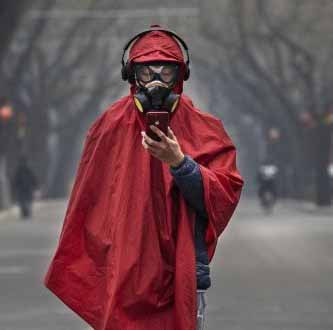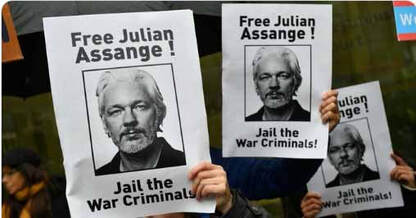 A resident of Hubei province on a near deserted street during the Chinese new year celebrations.
A resident of Hubei province on a near deserted street during the Chinese new year celebrations. CITIZENSHIP is in the news – again. The COVID-19 outbreak has raised questions about the responsibility of governments for their people overseas, caught up in situations outside their control. The press has been talking about “Australians” who have been “abandoned” in Wuhan or Hubei province.
It is not clear whether these are people who have Australian citizenship or who have permanent residency. It would appear that some may have dual Australian/Chinese citizenship and that this has complicated what China would allow in terms of evacuations and therefore what Australia was able to do to help them. Some of those left behind have talked about feeling abandoned by Australia. I’m sure I would feel the same, in their situation.
Julian Assange is another Australian citizen in trouble. It is unclear what assistance may have been provided by our government during this long saga or what diplomatic efforts may have been going on behind closed doors. However, it is clear that nothing has been effective in resolving the situation so far and Mr Assange is facing a hearing which might lead to extradition and a long prison sentence.
 Wikileaks founder Julian Assange faces extradition to the US for disclosing classified information. Photo: Wikileaks
Wikileaks founder Julian Assange faces extradition to the US for disclosing classified information. Photo: Wikileaks “There’s a lot of Australians on the left and the right who think Julian Assange is a ratbag," Mr Christensen told The Age. "But you know what? He’s our ratbag and he should be brought home.”
Again, a complex situation, but what should an Australian citizen be able to expect from their government, if they find themselves in such a situation?
Also in The Age on February 20, the street artist, Badiucao, who is of Chinese background but is now an Australian citizen, called on the Prime Minister to challenge the Chinese government about its human rights abuses. He is quoted as saying: “Doing your job is not about shaking hands with bushfire victims in front of camera but [to] protect and rescue Australian citizens.”
If we accept that premise, how far can our government go and how far does it wish to go, in protecting and rescuing its citizens? What rights can “Australians” reasonably expect?
Then there is the wonderfully named ‘Love Case’ where the High Court recently ruled that an Aboriginal person can’t be considered an “alien” under the constitution. Until now, an alien was a person who wasn’t an Australian citizen. Australianness depended on whether you were a citizen and race was irrelevant. The court found that you can be an Australian but not an Aboriginal person but you can’t be an Aboriginal person and not an Australian because “They have a deeper connection to this land than citizenship can bestow” and so “Indigeneity sits outside the bounds of citizenship.” (The Age, February 15)
 Dustin Martin's father was deported to New Zealand despite his Aboriginal heritage.
Dustin Martin's father was deported to New Zealand despite his Aboriginal heritage. All this makes the parliamentarians’ dual citizenship saga look like a storm in a tea-cup. However it has left me even more confused about what Australian citizenship means, what benefits it can bestow and what protections can be relied upon.
My Australian passport – the most visible benefit of my citizenship – has at the front the following request: “The Governor-General of the Commonwealth of Australia, being the representative in Australia of Her Majesty Queen Elizabeth the Second, requests all those whom it may concern to allow the bearer to pass freely without let or hindrance and to afford him or her every assistance and protection of which he or she may stand in need.”
I hadn’t read it in a while and was surprised that we were still invoking the Queen as our ultimate protector. It reads as if the Governor-General expects, or hopes, that others will provide “assistance and protection” in times of need. No mention of the Commonwealth. I haven’t read my UK passport recently either but I’m pretty sure the wording is that Her Majesty “requests and requires”, which is a bit stronger, at least in theory.
Who knew that the concept of citizenship could be so complex and confusing?